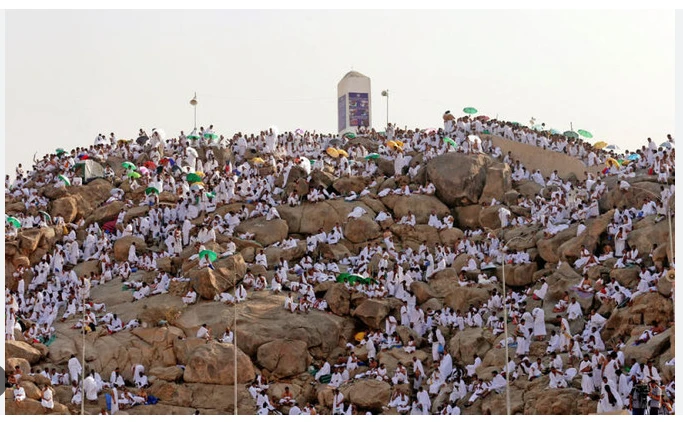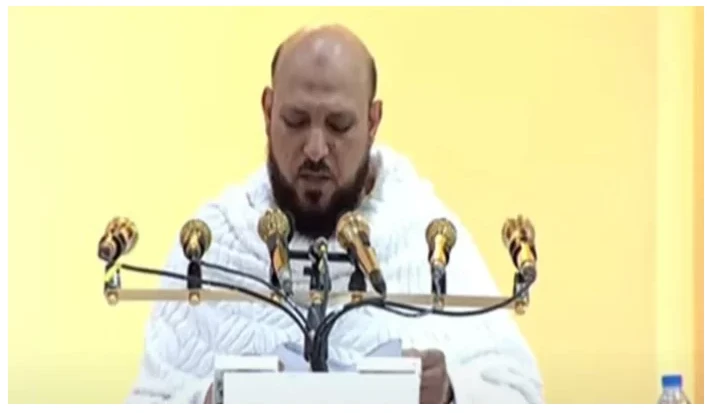Pilgrims pray on Mount Arafat after Hajj sermon calls for Ummah Unity

Stay tuned with 24 News HD Android App

More than 1.5 million pilgrims braved extreme heat to reach Mount Arafat on Saturday for the high point of the annual Hajj pilgrimage, praying for hours, especially for Palestinians in war-ravaged Gaza.
Clad in white, worshippers began arriving at dawn for the most gruelling day of the annual rites, ascending the rocky, 70-metre (230-foot) hill where the Prophet Mohammed (PBUH) had given his last sermon.
"This is the most important day," said 46-year-old Egyptian Mohammed Asser, who came prepared with a list of prayers. "I pray also for the Palestinians. May God help them."
Saudi Arabia's minister in charge of religious pilgrimages, Tawfiq al-Rabiah, warned last week that "no political activity" would be tolerated during the Hajj. But that did not stop at least one pilgrim from chanting in support of the Palestinians who have endured more than eight months of incessant bombardment.
"Pray for our brothers in Palestine, in Gaza... may God give victory to the Muslims," he shouted.
In a message to Hajj pilgrims on Saturday, Iranian supreme leader Ayatollah Ali Khamenei said "the ironclad resistance of Palestine and the patient, oppressed people of Gaza... must be fully supported in every way".
Some 2,000 Palestinians are performing the hajj at the special invitation of Saudi King Salman, official media said.
Hajj sermon
Sheikh Dr Maher Al Muaiqly delivered the Hajj sermon at Masjid-e-Nimra on Saturday, urging Ummah to forge unity and cohesion among their ranks.
Imam Sheikh Dr Maher Al Muaiqly called upon Muslims to forge unity, saying it would “surely lead to salvation of the Ummah in addition to averting any discords or divisions”.
He said “Muslims should exhibit best of the manners as only those who will have good manners will be close to the Holy Prophet (peace be upon him) on the day of judgment”.
He said Allah has ordered Muslims to keep praying and paying zakat to the needy people.
The Imam said there is no one worthy of worship except Allah and guidance exists only in following the elements of Islam. Allah has ordered to follow the directions of Prophet Muhammad (PBUH).
The Imam further said that prayer protects from evil, urging Muslims to keep themselves safe from the whispers of Satan. Pay Zakat, take care of the rights of the servants, there is guidance for the people in the Holy Quran, he said.

He also emphasized that worship is for Allah alone and only Allah’s command is supreme. He stated that whoever adopts piety will receive sustenance from sources they could never imagine.
He highlighted that Allah owns everything and has revealed the Quran as a mercy to improve people’s conditions. The Quran, full of wisdom from the All-Knowing, guides people to the right path, and he testifies to this, he said.
He stated that Allah grants success and salvation to the pious, and they will not suffer on the Day of Judgment. Those who adopt piety will receive sustenance from unimaginable sources, and Allah will forgive their sins and increase their rewards.
He emphasized that worship is solely for Allah and His command is the true religion, urging people to worship their Lord, who created them and those before them, affirming the testimony of Tawheed (Oneness of God).
He proclaimed that Allah is One without partners; all creation and matters belong to Him. Allah said His mercy encompasses everything, and He is sufficient for those who rely on Him. He urged people to fear Allah, as piety leads to success, and not be deceived by worldly life.
He said Prophet Muhammad (peace be upon him) is Allah’s Messenger, sent as a mercy to all worlds. Allah commanded to follow the Prophet, and those who follow Allah and His Messenger’s commands will succeed in this world and the Hereafter, he added.
The Imam reminded that there is no deity worthy of worship except Allah, and Allah is sufficient for those who trust Him. He warned of a day when neither son can help father nor father his son. Performing prayers, which prevent wrongdoing, and trusting in Allah leads to success in both worlds.
He advised to guard against Satan’s deceptions and whispers, to speak of Allah, and to uphold justice. Those who trust in Allah will be successful in both worlds, and sustenance will come from unexpected sources. He encouraged walking on the path of righteousness, recognizing Allah’s greatness and wisdom. Islam commands to give rights to the rightful, so believers should observe the rights of others and pay Zakat.
He stated that disobedient children will not succeed in this world or the Hereafter. Islam forbids betrayal of trust; Allah is All-Hearing and All-Seeing. Believers should obey Allah and His Messenger, as humanity was created to worship Allah. He commanded not to kill unjustly and promised forgiveness for those who follow the path of piety.
The Imam explained that Islam protects from immorality and evil. Allah forbade unjust consumption of wealth, urged avoidance of mischief and corruption, and prohibited calling people by offensive names. The best person is one who treats their family well. Muslims should cooperate in righteous deeds, and following the pillars of Islam leads to guidance.
He concluded by urging the public to respect each other’s rights, not to kill unjustly, and to make decisions with justice. Alcohol and gambling are Satanic acts, he warned.
- 'Scary' heat -
The Hajj, one of the world's biggest religious gatherings, is increasingly affected by climate change, according to a Saudi study published last month that said regional temperatures were rising 0.4 degrees Celsius each decade.
The rituals, which take at least five days to complete and are mostly outdoors, are "not easy because it is very hot", said Abraman Hawa, 26, from Ghana. "We have sun... but it is not as hot. But I will pray to Allah at Arafat, because I need his support," she added.
The temperature was expected to hit 43 degrees Celsius (109.4 degrees Fahrenheit) on Saturday, creating challenges for pilgrims who arrived at Mount Arafat after spending the night in a giant tented city in Mina, a valley outside Makkah.
Saudi authorities have urged pilgrims to drink plenty of water and protect themselves from the sun. Since men are prohibited from wearing hats, many carry umbrellas.
More than 10,000 heat-related illnesses were recorded last year, 10 percent of them heat stroke, a Saudi official told AFP this week.
Ahmad Karim Abdelsalam, a 33-year-old pilgrim from India, admitted that he found the prospect of passing hours on Mount Arafat "a little scary". But with the help of an umbrella and water sprays, "God willing, everything will go well", he said.
- 'Once in a lifetime' -
The Hajj is one of the five pillars of Islam and all Muslims with the means must perform it at least once.
Yet visas, doled out to individual countries on a quota system, can be difficult to obtain.
"It's a chance that only comes once in a lifetime, I couldn't not come," said Abdulrahman Siyam, a 55-year-old Iraqi pilgrim who was performing the rituals on a prosthetic leg.
After Mount Arafat, the pilgrims will head to Muzdalifah, where they will collect pebbles to carry out the symbolic "stoning of the devil" ritual in Mina on Sunday.
The Hajj is said to follow the path of the Prophet Mohammed's (PBUH) final pilgrimage, about 1,400 years ago.
It is an important source of legitimacy for the Al Saud dynasty, whose monarch has the title "Custodian of the Two Holy Mosques", in Makkah and Madinah.
It is also a major financial windfall for the conservative country, which is trying to develop religious tourism as part of a drive to reduce its dependence on crude oil.
The kingdom received more than 1.8 million pilgrims last year for the Hajj, around 90 percent of whom came from abroad.
It also welcomed 13.5 million Muslims who came to perform Umrah, the pilgrimage which can be done year-round, and aims to reach 30 million pilgrims in total by 2030.
